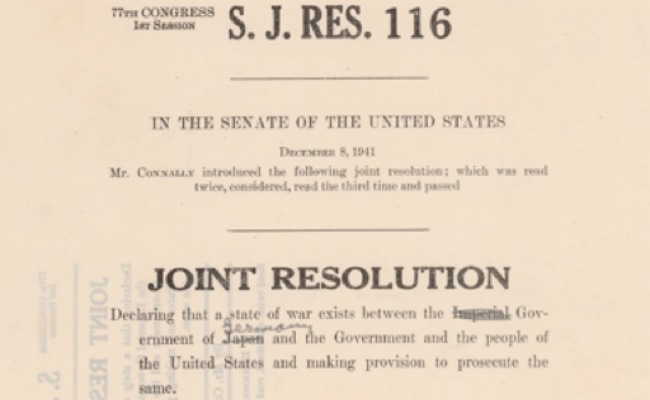All the Previous Declarations of War
Congress has formally declared war only 11 times in U.S. history, and authorized the use of military force 11 times.

As we head into a period of vigorous congressional debate over whether to authorize the use of force against Syria, it's instructive to look back at America's history of congressional war declarations. The Congressional Research Service put together a great mini-history in 2011, "Declarations of War and Authorizations for the Use of Military Force: Historical Background and Legal Implications," by Jennifer Elsea and Richard Grimmett, which is worth a read at this juncture.
The obvious take-home is that America has done a better job of winning its declared wars in the last century than achieving clear-cut victories in ventures authorized under legislative measures that fell short of a formal declaration of war.
The United States Congress has not formally declared war since World War II. All of our wars in the Middle East have been authorized using other means, which rather goes to the heart of the nature of those different conflicts. U.S. entry into World War I and World War II took place through joint congressional resolutions stating "a state of war exists between the Government of Country X and the Government and People of the United States," where country X was, variously, Germany, Japan, Italy, and so on.
It would be impossible to write such a sentence about Syria today. In what meaningful way does a state of war exist between the United States and Syria? None. That's why Congress, if it approves anything, will approve an authorization for the use of force. And if history is any guide, that's going to be a rather open-ended commitment, as fuzzy on the back-end as on the front.
Here are the 11 formal declarations of war:

And here are the 11 conflicts governed by congressional legislation authorizing force but not declaring war, per the CRS report.
- May 28, 1798 and July 9, 1798. FRANCE. Legislation authorizing the president to instruct commanders of U.S. Navy warships to “subdue, seize and take any armed French vessel which shall be found within the jurisdictional limits of the United States, or elsewhere, on the high seas...”
- February 6, 1802. TRIPOLI. Legislation authorizing the president to “equip, officer, man, and employ such of the armed vessels of the United States as may be judged requisite...for protecting effectually the commerce and seamen thereof on the Atlantic ocean, the Mediterranean and adjoining seas" in response to threats from Tripoli.
- March 3, 1815. ALGERIA. Legislation authorizing the president to use the U.S. Navy, “as judged requisite by the President” to protect the “commerce and seamen” of the United States on the “Atlantic Ocean, the Mediterranean and adjoining seas” in response to conflict with the Dey and Regency of Algiers.
- March 3, 1819. PIRATES. Legislation enacted “to protect the commerce of the United States, and punish the crime of piracy.”
- January 29, 1955. FORMOSA. Legislation authorizing the president to “employ the Armed Forces of the United States as he deems necessary for the specific purpose of securing and protecting Formosa, and the Pescadores against armed attack....”
- March 9, 1957. THE MIDDLE EAST. “To undertake, in the general area of the Middle East, military assistance programs with any nation or group of nations of that area desiring such assistance.”
- August 10, 1964. SOUTHEAST ASIA. Gulf of Tonkin resolution.
- October 12, 1983. LEBANON. "The Multinational Force in Lebanon Resolution."
- January 12, 1991. IRAQ. Congress passed the “Authorization for Use of Military Force Against Iraq Resolution.”
- September 18, 2001. TERRORISTS. A joint resolution to authorize "the president to use all necessary and appropriate force against those nations, organizations, or persons he determines planned, authorized, committed, or aided the terrorist attacks that occurred on September 11, 2001, or harbored such organizations or persons, in order to prevent any future acts of international terrorism against the United States by such nations, organizations or persons."
- October 16, 2002. IRAQ. "Authorization for Use of Military Force against Iraq Resolution."
Update: "Where is Korea?" the commenters, below, cry. That is a good and tricky question. The Korean War was not authorized by Congress. President Truman committed American troops in Korea in 1950 under the United Nations Participation Act of 1945, which was ratified by the U.S. Senate, citing resolutions passed by the United Nations Security Council in 1950. This precedent -- the constitutionality of which has been debated -- has been cited by subsequent presidents as justification for using military force without congressional authorization, as in Panama in 1989 and Iraq in 1990 under George H.W. Bush, and Haiti and Bosnia under President Clinton in 1994. According to a 1995 article in the American Journal of International Law, "Presidents and their advisers point to more than two hundred incidents in which Presidents have used force abroad without first obtaining congressional approval."
The Law Library of Congress, part of the Library of Congress, has a solid fact sheet on the War Powers Resolution of 1973 and some of the military actions that have led to reports to Congress under it, even if there was not advance authorization. One key point from it to keep in mind: "U.S. Presidents have consistently taken the position that the War Powers Resolution is an unconstitutional infringement upon the power of the executive branch."